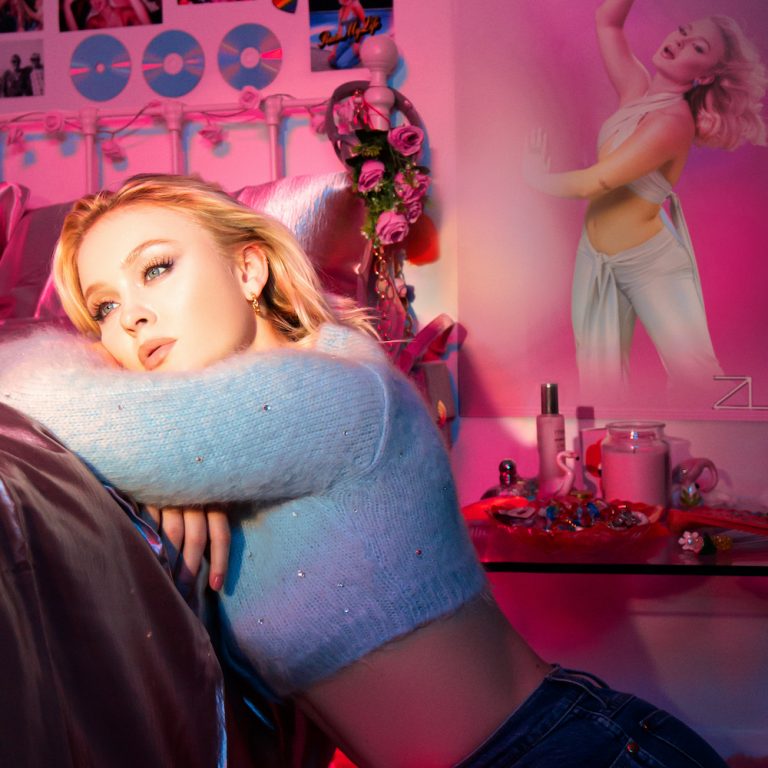“Patience is a virtue,” sings Zara Larsson at the beginning of R&B-pop jam “Talk About Love”, a proverb that underlines the journey to the release of her new album. Indeed, the wait for the follow-up to her 2015 international debut album So Good has been rife with delays and droplets that left questions as to when her new era was officially starting. However, with a huge sigh of relief, the Swedish pop princess has returned with the colourful Poster Girl. Different from her previous album, which jumped from genre to genre, the album demonstrates to an extent a tighter focus on slick dance-pop – with some deviations. However, there’s an overall lyrical cohesion in its unabashed exploration of romance and all its different facets.
The album opens up with the stunning – and pleasantly risky choice of a single – “Love Me Land”, Opening with siren-like synths, the song progresses into a shadowy and sexy play between deep synths, syncopated beats and frantic strings. On this track, Larsson explores the wonder of rediscovering love and pleasure with an assertive maturity: “How dare you have lips like that? / How dare you gon’ kiss like that?”. She also showcases her powerful vocals as she exclaims: “Take me home / Don’t call me Mary.” This proves a great introduction for Poster Girl and starts the thread of dance-pop that is the album’s strongest aspect.
The thread continues with “Need Someone”, with its mid-tempo piano riffs, bass and swinging rhythm feels like a dance track from the mid-2000s (important to note: this is a compliment) with its combination of groove and emotion. Larsson sings that although she’s content with life, she still wants romantic companionship. The following “Right Here” is a chill dance track that feels a bit more modern, beginning with minimalist keyboards before transforming into a satisfying combination of synths, glitchy beats and skittering drums, Larsson sings her frustrations about being unnoticed by a suitor, listing off all her potential ploys for attention “I could have two girls in this bed” or “Naked at dinner and kissing the waiter / The baddest behaviour” – yet she still wouldn’t succeed. It’s this kind of combination of fun and melancholy that emphasises the emotional pull and power dance music has.
Supporting this, “Look What You’ve Done” feels like a sonic sequel to “Love Me Land” with its ABBA-isms, pulsating beat, and high-pitched fiddle. Yet, lyrically, it flips the script; instead of feeling the euphoria of realised romance, Larsson frees herself from heartbreak on the dancefloor: “Cause now that you’re gone, I’m number one / Boy, I should thank you for who I’ve become.”
The biggest sugar rush on this album however is the title track, “Poster Girl”; a glorious highlight of fun disco revival and undoubtedly the entire project’s centrepiece and mission statement. Over a colourful swirl of bass rhythms, electric guitar and groovy drums, Larsson finds her quest for contentment in being alone disrupted by a love interest: “I was focused on me / My own energy / Trying to negotiate the conflict in myself.” The highlight of this track is its undeniable whirlwind chorus where Larsson admits that, despite her reluctance, the heart wants what it wants: “Holy smokes / I’m not / The poster girl of feelings / but with you I can’t stop.” This track is definitely a contender for next single because you will want to revisit it again… and again.
Where the album does misstep is in its deviations from the dance-pop, which disrupts the overall vibe and tends to play it safe. The inclusion of 2018 single “Ruin My Life” – a pop track about willingly wanting someone back despite their turbulent relationship – is, despite its catchiness, lacking the sparkle of other tracks. Although the song was a success for Larsson, if she was to include any older tracks on this album then songs such as the immensely underrated “Don’t Worry ‘Bout Me” and fan favourite “All The Time” would’ve consolidated the album’s vision better.
“I Need Love” is a vocoder-drenched pop-R&B track that doesn’t quite explode as it should. While sweet in sentiment, the lyrics tread cliches (“I need love… / Like an addict needs a drug”) and questionable comparisons (“Like a hunter needs his blood”). Coming later in Poster Girl, the guitar-driven “Stick With You” is melodically great and another demonstration of Larsson’s impressive vocals, but it falls under the same lyrical pitfalls as “I Need Love” with a tendency towards the same-old.
The album does find its footing again towards the end, especially with the upfront track “FFF” – an acronym for ‘Falling For a Friend’. With cheeky synths, bass guitar and a general energy that makes you want to strut, Larsson sings about a friendship blurring into sexual tension: “Is there a spark for us / Or is it just purely platonic? / Is this a story arc? / Cause if it are, it’d be iconic.” This song cannot help but invoke the imagery of a club drenched in muted neon light. Final track “What Happens Here” may not conclude this album on the same sweaty dance energy as earlier highlights, but it is a bright and confident track about simply admitting you want someone; “My guy wouldn’t waste time analysing / So c’mon, come and get it if you want it,” she sings over colourful R&B production.
Poster Girl is a step forward in a somewhat more concise direction for Larsson, but it could have used some fine-tuning to fully commit to its vision. She has created an album that is unapologetically romantic and fun but lacking in consistency production-wise. Despite its unevenness, this album is still a satisfying exploration on how love is frequently messy, unbalancing and misleading – but ultimately worth the struggle because when it’s good, it’s great. Larsson is definitely coming more into her own as a pop star and we can only hope the wait for the next project isn’t as long.

